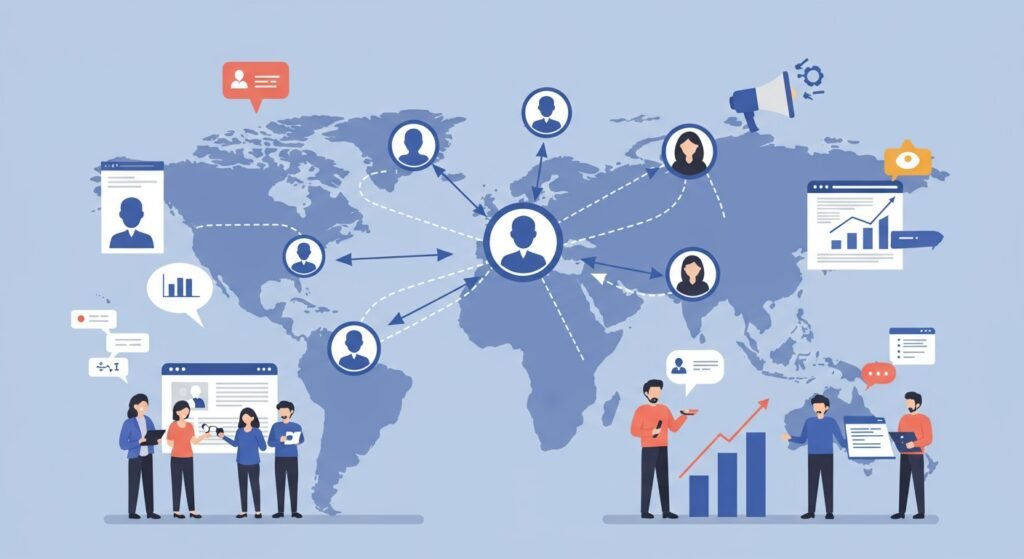
Off-Page SEO
Elevate your brand with our expert Off-Page SEO services. We build high-quality backlinks to boost your authority and organic visibility globally.
Off-page SEO is about everything that doesn’t happen directly on your website including link building and popularity improvement on social media platforms like Facebook, Twitter, LinkedIn or Google My Business.

Optimizing your website is called on-page SEO and includes things like site structure, content and speed optimizations.
Off-page SEO supplements on-page SEO. Both go hand in hand. You need to focus on your link building, branding and appearance efforts to make the most of your SEO. You can optimize your site all you want, but if it isn’t perceived as a quality destination for people, you won’t do well.
What Is Off-Page SEO?
Off-Page SEO Services for Digital Growth
We help brands in the UK, US, Canada, Australia, and the UAE build their online authority and visibility. Our Off-Page SEO services are designed to enhance your digital reputation. We want to ensure your website is recognized as a leader in your industry. So, we work on building a strong and credible presence across the internet. After all, a solid online reputation is essential for long-term success.
We understand that the digital landscape is competitive. Therefore, our focus is on creating a robust Off-Page SEO strategy that sets you apart. We believe that true authority comes from quality, not just quantity. This is why we meticulously build and nurture relationships to secure valuable links and mentions that truly matter for your brand.
Comprehensive Off-Page SEO Services
We offer a suite of Off-Page SEO services to help your brand gain traction and credibility. We know that every business is unique, so our strategies are always tailored to your specific needs. Our approach is holistic. It combines technical expertise with creative execution to achieve the best possible outcomes. So, let’s explore the services we provide.
Strategic Link Building
We believe that strategic link building is the foundation of a strong Off-Page SEO campaign. We focus on acquiring high-quality backlinks from authoritative and relevant websites. Our process is manual and meticulous; we never resort to automated or spammy tactics. We identify opportunities that provide genuine value, ensuring each link is a testament to your brand’s credibility.
Next, our team conducts thorough research to find reputable websites that align with your industry. We then reach out to them directly with a personalized approach. Our goal is to build relationships with site owners and editors, not just to get a link. This means we’re focused on securing placements that will drive both referral traffic and SEO value.
Expert Guest Posting
Guest posting is a powerful way to showcase your expertise and gain exposure to new audiences. We identify high-authority blogs and online publications where your target audience spends time. Then, we craft unique, valuable content that provides real insights. We make sure every article we write is well-researched and engaging, providing a great experience for the reader.
Finally, we work closely with editors to get your content published. We ensure that the guest post includes a contextual backlink to your site. This process not only helps your SEO but also positions you as a thought leader in your field. By the way, we also make sure the content is optimized to perform well on its own.
Professional Digital PR
Digital PR is all about creating online buzz and securing high-profile media coverage for your brand. We combine traditional public relations tactics with modern digital marketing strategies. We develop compelling stories and campaigns that catch the attention of journalists, bloggers, and influencers. Then, we pitch these stories to relevant outlets to earn powerful mentions.
Nevertheless, we don’t just focus on the big wins. We also look for opportunities for your brand to be featured in industry roundups, interviews, and expert quotes. After all, every high-quality mention adds to your brand’s authority. This approach helps us secure links from major news publications and industry-leading websites, which is invaluable for your SEO.
Brand Mentions and Citations
We understand that not every mention of your brand will include a link. However, brand mentions and citations still play a crucial role in Off-Page SEO. We work to ensure your brand is consistently and accurately mentioned across relevant directories and business listings. This builds trust and authority in the eyes of search engines.
Oh, and we also monitor the web for unlinked brand mentions. When we find them, we reach out to the site owner to see if a link can be added. This is a simple but highly effective way to gain valuable backlinks. We make sure your brand information is consistent everywhere, which is especially important for local SEO efforts.
Powerful Social Media Marketing
We use social media platforms to build brand awareness, engage with your audience, and drive traffic back to your site. Our social media marketing services go beyond simple posting. We craft a strategy to create shareable content, participate in relevant conversations, and build a strong, active community around your brand. While social signals are not a direct ranking factor, they can significantly increase the visibility of your content and lead to natural links.
Strategic Google Maps Optimization
We help businesses improve their local visibility and dominate the local search results. Google Maps optimization is a crucial part of our Off-Page SEO strategy, especially for businesses with a physical location. We make sure your Google Business Profile is fully optimized, with accurate and consistent information. We’re also working on gathering genuine reviews from your customers to boost your local authority.
Influential YouTube Marketing
YouTube is the world’s second-largest search engine. So, we help brands create a powerful presence on this platform. Our team develops strategies for creating engaging video content, optimizing video titles and descriptions for search, and building a community around your channel. We also work on securing collaborations with other creators and influencers, which can send valuable traffic and signals back to your website.
Engaging Podcast Outreach
Podcasts are a fantastic way to reach a highly engaged, niche audience. We help you get featured as a guest on relevant podcasts in your industry. We identify shows that align with your brand and pitch compelling topics that showcase your expertise. This not only gives you a platform to share your message but also secures high-quality brand mentions and links from the show notes. After all, it’s a great way to build your reputation.

Elevate Your Brand’s Authority Today!
We are ready to help you take your digital presence to the next level. Our team of experts has a proven track record of helping businesses achieve remarkable growth. We believe that your success is our success, and we are committed to delivering results that exceed your expectations.
So, let’s start a conversation about your Off-Page SEO goals. We’ll show you how a strategic and professional approach can significantly boost your brand’s online authority and visibility. You can contact us for a personalized consultation, and we’ll create a custom strategy designed just for you. We’re eager to partner with you on your journey to the top of the search rankings.
What is Off-Page SEO?
Off-page SEO represents the efforts taken outside of a website to improve its search engine rankings. Off-page SEO includes link building, Google maps, and social media popularity.
What off-page SEO services do you offer?
We provide a comprehensive range of Off-Page SEO services designed to build your brand’s authority. Our offerings include strategic Google Maps Optimization for local visibility, influential YouTube Marketing for video search, and engaging Podcast Outreach to secure guest spots. We also specialize in Powerful Social Media Marketing to build brand presence, Strategic Link Building for high-quality backlinks, Expert Guest Posting on authoritative blogs, and Professional Digital PR to earn media coverage. Finally, we manage Brand Mentions and Citations to ensure consistency and trust across the web.
Why is Off-Page SEO so important for my business?
Off-Page SEO is crucial because it tells search engines that your website is a credible and valuable resource. When other reputable websites link to you, it acts as a vote of confidence. Search engines like Google use these votes to determine your site’s authority and relevance for specific search queries. Still, a strong Off-Page SEO strategy can lead to higher rankings, more organic traffic, and increased brand visibility.
What is your process for creating a custom Off-Page SEO strategy?
Our process begins with a detailed analysis of your current backlink profile and competitive landscape. We look at who is linking to you now and what your top competitors are doing. Then, we develop a custom strategy tailored to your specific goals and budget. We’ll discuss the types of links we’ll pursue, the content we’ll create, and the timeline for the campaign. Finally, we’ll implement the plan and provide regular updates on our progress.
How is Off-Page SEO different from On-Page SEO?
On-Page SEO involves optimizing elements on your website that are within your control. This includes things like content quality, keyword usage, meta tags, and site speed. Conversely, Off-Page SEO is about external factors. This includes building links from other sites, generating social media mentions, and securing brand citations. Both are essential for a complete SEO strategy, but they address different aspects of a site’s performance.
How long does it take to see results from Off-Page SEO efforts?
The timeframe for seeing results from Off-Page SEO can vary. After all, it’s a long-term strategy. You may start to see improvements in rankings and organic traffic within a few months, but significant, lasting results often take six to twelve months or longer. It depends on your industry’s competitiveness, your current backlink profile, and the overall quality of the campaign. Patience is key.
Do social media signals and brand mentions help with SEO?
Yes, they do. While social media signals like likes and shares are not a direct ranking factor, they can indirectly impact your SEO. They increase the visibility of your content and can lead to more people discovering and linking to your site. Furthermore, brand mentions, even without a link, contribute to your brand’s authority and trust, which search engines take into account. They are part of a holistic Off-Page SEO strategy.
How do you measure the success of an Off-Page SEO campaign?
We measure success using a combination of key performance indicators (KPIs). We track increases in your website’s domain authority, improvements in keyword rankings, and growth in organic traffic. We also monitor the number and quality of new backlinks acquired and the referral traffic they send. We provide transparent reports so you can see the direct impact of our efforts.